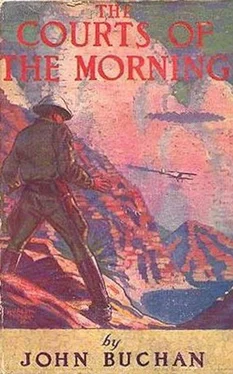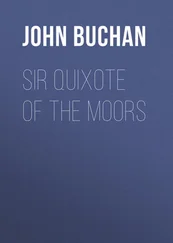John Buchan - The Courts of the Morning
Здесь есть возможность читать онлайн «John Buchan - The Courts of the Morning» — ознакомительный отрывок электронной книги совершенно бесплатно, а после прочтения отрывка купить полную версию. В некоторых случаях можно слушать аудио, скачать через торрент в формате fb2 и присутствует краткое содержание. Жанр: unrecognised, на английском языке. Описание произведения, (предисловие) а так же отзывы посетителей доступны на портале библиотеки ЛибКат.
- Название:The Courts of the Morning
- Автор:
- Жанр:
- Год:неизвестен
- ISBN:нет данных
- Рейтинг книги:3 / 5. Голосов: 1
-
Избранное:Добавить в избранное
- Отзывы:
-
Ваша оценка:
- 60
- 1
- 2
- 3
- 4
- 5
The Courts of the Morning: краткое содержание, описание и аннотация
Предлагаем к чтению аннотацию, описание, краткое содержание или предисловие (зависит от того, что написал сам автор книги «The Courts of the Morning»). Если вы не нашли необходимую информацию о книге — напишите в комментариях, мы постараемся отыскать её.
The Courts of the Morning — читать онлайн ознакомительный отрывок
Ниже представлен текст книги, разбитый по страницам. Система сохранения места последней прочитанной страницы, позволяет с удобством читать онлайн бесплатно книгу «The Courts of the Morning», без необходимости каждый раз заново искать на чём Вы остановились. Поставьте закладку, и сможете в любой момент перейти на страницу, на которой закончили чтение.
Интервал:
Закладка:
The young party from the Corinna did not appear to find the time hang heavy on their hands. There were ten of them, five of each sex, with no older person to look after them, though a very moderate chaperonage seemed to be exercised by a tall girl with fine eyes and a pleasant Southern voice. That their purchase was considerable was shown by their entertainment, for they were shown everything and went everywhere; that they were unwelcome visitors, unwillingly privileged, was proved by their close oversight. Indeed they were uncomfortable guests, for they made a patch of garish colour in the drab of the Gran Seco and a discord in its orderly rhythm. The mere sight of them in the streets was enough to send the ordinary policeman to the Commissary to ask for instructions.
They were patently harmless, but deplorably silly. The Regina was turned by them into a cabaret. They danced every night in the restaurant to the disquiet of the diners, and they chaffed mercilessly an unsmiling staff. Bedroom riots seemed to be their speciality, and it was an unlucky official of the Company who had his quarters in their corridor. When they were entertained to luncheon by the Administration they asked questions so sublimely idiotic that the Vice-President, a heavy sallow man, called Rosas, of Mexican extraction, actually coloured, thinking that he was being made a fool of; and their visit to the smelting plant was attended by the same exasperating buffoonery. Presently it appeared that their idiocy was congenital and not a pose. Their jazz chatter and jazz manners were the natural expression of jazz minds, and must be endured because of the prestige of Mr Burton Rawlinson. So "Baby" and "Bawby" and "Honey" and "Gerry" went their preposterous way, and the Gran Seco shrugged outraged shoulders and spat.
Nevertheless there were signs, had there been eyes to note them, that the yacht party was not quite what it seemed. In unguarded moments, as Janet had already observed, they could be betrayed into sanity and good breeding. At nights, too, when their ragging was over, there were odd discussions in the privacy of bedrooms. At least one of the young men would sit far into the dawn working at notes and plans.
Presently, as if they had had enough of the city, they extended their revels into the surrounding country. They procured two touring cars, and, after some trouble with the Commissary of Police, embarked on long excursions. The mines lie in three main groups--the San Tomé, the Alhuema, and the Universum--and they visited all three. There they seemed to find much to interest them, and the managers feverishly telephoned to headquarters for instructions. These children were imbeciles doubtless, they reported, but they were poking their noses into forbidden places. So on their return the troupe had to interview the Commissary of Police, who politely cautioned them against breaches of the regulations of the province.
Their next escapade was more serious. They packed luncheon-baskets and departed, as they said, for a visit to the caves of Marequito--a permitted excursion. Then for three days they disappeared, the police were furious and anxious, and a posse was sent out in motor-cars to discover their whereabouts. Six of the party--five girls and a man--and one of the cars were found two hundred miles off in a valley under the high peaks called the Spanish Ladies. They told a pitiful story; they had lost their road, exhausted their food, and had had to spend chilly nights on the ground. The other car had gone off the day before to find supplies, and had not returned.
The inspector of police wrung his hands. "Do you not know that in these parts the natives are dangerous? You have narrowly escaped throat-cutting." The party was sent back to the city in disgrace, but they did not seem to feel their position. They were inordinately cheerful, and scarcely looked as if they had suffered a three days' fast.
In spite of the police activity no word came of the other car, till two days later it returned brazenly of its own accord. The occupants told the same story--a lost road, a breakdown, semi-starvation, a lucky meeting in the end with an intelligent vaquero who put them on the way to the San Tomé mine. This party did indeed show some signs of privation, and one of the four men had his arm in a sling, the result, he said, of a fall from a rock when he was trying to get a prospect.
There was a stern inquiry at the office of the Commissary, and the four were closely cross-examined about their journey. But they proved to be bewildered and obtuse. Their accounts conflicted, and when maps were placed before them they were quite unable to point out their route. "Can't you realise that we were lost?" they repeated, "lost like a tick in a wood-pile? What d'you keep worrying about? It's no good quoting lists of your darned hills. We can't locate them."
After this episode the American party showed better behaviour. For the last days of their stay they confined themselves to the city, and got up a fancy-dress ball in the Regina, into which they dragged some of the unwilling residents. The young man with his arm in a sling did not appear at this function; indeed he did not leave his room, being a little fevered--so he told the hotel servants--by his accident, though he refused to see a doctor. This was perhaps natural, for in the small hours after his return there had been some rough surgery in his bedroom. One of his companions had cut out a pistol bullet from above his left elbow, and the tall girl, who had once nursed in a hospital, had done the bandaging.
Archie and Janet were very different visitors. It almost appeared as if they were welcome ones. A special coach was attached for them to the Santa Ana train, and this was shunted on to the Gran Seco line. It contained two compartments, in one of which they were given excellent meals, while the other was on the lines of an observation car, so filled with bridal flowers that Archie looked anxiously about for rice and slippers. They were also given a guide, a well-mannered young Olifero who unobtrusively offered information. He pointed out the objects of interest on the way to Santa Ana, and during the hour of waiting there conducted them over the cathedral, which has a famous altar-piece, and, under the great crucifix, told with pride the tale of the first Conquistadors. The long climb into the Gran Seco was enlivened by his anecdotes. He showed them the valley where Toledo's men had been ambushed by Indians, the corner where the copper convoy had once been destroyed by a landslide, the gully which had long defied the railway engineers. At the frontier station he had managed their passes for them, and as the train crawled on to the plateau had sketched for them vivaciously the history of the mining industry.
"We can't tip this fellow," Archie whispered to Janet. "He's a gentleman." And his wife had agreed.
He saw them to their hotel, where rooms had been secured for them by the Administration. On parting, Archie and Janet warmly thanked him, and asked him his name. The young man smiled pleasantly. "That is nice of you, for I think we shall meet again. They call me Carlos Rivero." He added, "I am a friend of Luis de Marzaniga," and it seemed to Archie that his eyes said something confidential which he could not fathom.
The Moplahs were in the hotel, but in a somewhat chastened mood. The tall girl, whom Janet believed she had recognised, did not appear, nor did the young man in the starched linen knickerbockers, though Archie looked for him longingly. But the corybants of the Club de Residentes Extranjeros were there and greeted them with boisterous friendliness, though, somewhat to Janet's surprise, they did not invite them to join their party.
In any case that would have been impossible, for the newcomers found a complex programme provided for their entertainment. They had no occasion to hire a car: the Administration provided one, a neat Daimler limousine which at all hours waited on their convenience. They were shown every phase of the great industry, and the day after their arrival they lunched with the Administration. The Gobernador himself appeared at the meal, an honour which, it was hinted, was almost unexampled. He apologised for the absence of the Vice-President, the same who had been made to blush by the Moplahs. "My colleague," he said, "sends his profound apologies, but at the moment he is suffering from a slight attack of jaundice. He deeply regrets that he cannot be here to welcome you, for he has many friends in your country and in Europe. He is of Mexico, and a Mexican is like a Russian--his country is so remote from the life of the world that he must needs adopt all countries. He is the true international."
Читать дальшеИнтервал:
Закладка:
Похожие книги на «The Courts of the Morning»
Представляем Вашему вниманию похожие книги на «The Courts of the Morning» списком для выбора. Мы отобрали схожую по названию и смыслу литературу в надежде предоставить читателям больше вариантов отыскать новые, интересные, ещё непрочитанные произведения.
Обсуждение, отзывы о книге «The Courts of the Morning» и просто собственные мнения читателей. Оставьте ваши комментарии, напишите, что Вы думаете о произведении, его смысле или главных героях. Укажите что конкретно понравилось, а что нет, и почему Вы так считаете.












